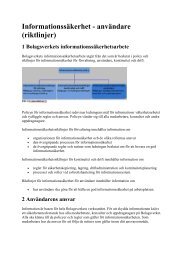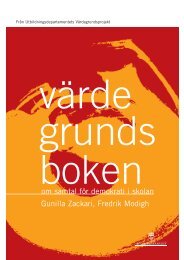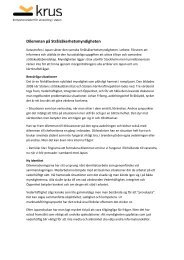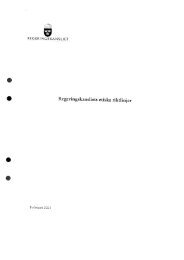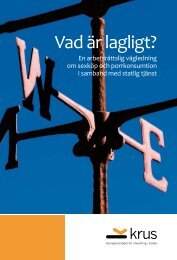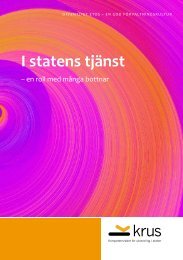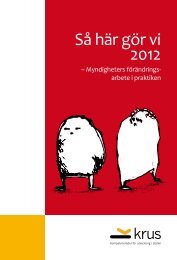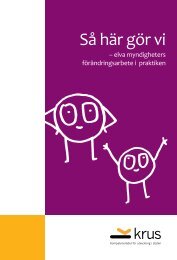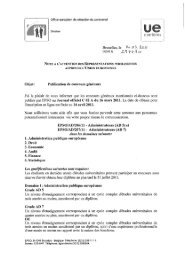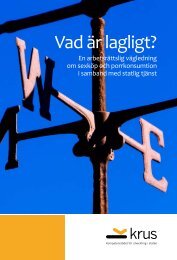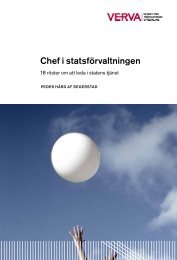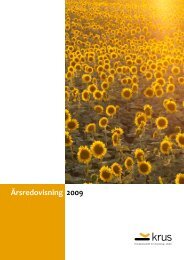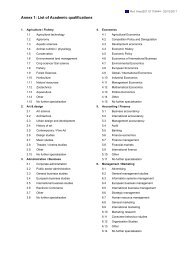Dialogkompetens i skolans vardag - Publikationer - LTU - Luleå ...
Dialogkompetens i skolans vardag - Publikationer - LTU - Luleå ...
Dialogkompetens i skolans vardag - Publikationer - LTU - Luleå ...
You also want an ePaper? Increase the reach of your titles
YUMPU automatically turns print PDFs into web optimized ePapers that Google loves.
548 A.-C. Wennergren and K. Rönnerman<br />
research in teaching, Zeichner and Noffke (2001) examine various traditions of practitioner<br />
research, and their differing purposes, that have been developed during the<br />
twentieth century. The outcomes of many such projects have been positive, as practitioner<br />
research can be a way of questioning one’s own practices and changing them<br />
as a result of ongoing studies. In the process of changing practice, the practitioner’s<br />
understanding of it also develops and deepens, and thus teachers become producers as<br />
well as consumers of knowledge (Zeichner & Noffke, 2001). A key element in such<br />
projects is the relationship between researchers and teachers. But there is also a risk that<br />
action research can become detached from its emancipatory aims, as Carr and Kemmis<br />
(1986) emphasised in their classical book and reduced to a method for in-service training<br />
comprising little more than a box of research techniques (Carr & Kemmis, 2005).<br />
In Sweden, practice-based research is emphasised. Such research is supposed to<br />
relate to teachers and connect to teacher education, teachers’ practice and teacher<br />
professionalism. The main idea is that research should be useful in practice and lead<br />
to a better connection between academic research and improvement work in schools<br />
(cf. McLaughlin & Black-Hawkins, 2004). This can be achieved by starting from<br />
the teachers’ own questions related to teacher professionalism in research that<br />
involves teachers as integrated participants in the process. According to the National<br />
Curriculum in Sweden (National Agency for Education 1 ), teachers and schools have<br />
the responsibility to develop teaching and the learning environment, and to improve<br />
the school as a whole. This development should derive from the schools’ own context<br />
and visions. To support such research, the National Agency for Education funded<br />
projects that were conducted in cooperation with universities. One way of understanding<br />
practice-based research is to use action research for the purpose of challenging<br />
and improving teachers’ practice.<br />
In this context, a national school improvement project involving five compulsory<br />
schools in Sweden, located in different parts of the country, was started in 2002. The<br />
project was designed as a collaborative project based on action research; it was<br />
conducted over a three-year period with the overall aim of improving classroom<br />
communication for hard-of-hearing pupils. Pupils in those schools need hearing aids<br />
and/or technical equipment in order to be able to listen in the classroom. The traditional<br />
technological solutions had contributed to an inflexible arrangement of the<br />
learning environment. In order not to risk misunderstandings, pupils preferred to<br />
speak to the teacher, rather than to their classmates, which led to a relatively passive<br />
approach among students in the classroom (Ahlström & Preisler, 1998; Wennergren,<br />
2004b). A monologic view of classroom communication had been established in<br />
classrooms and taken for granted as the only way to communicate (Wennergren,<br />
2006). Viewed from a participatory and collaborative approach, everybody involved<br />
in the project understood it as offering a possibility for teachers to explore the way in<br />
which their practices were shaped and constrained by wider social structures, and also<br />
allowing participants the opportunity to consider whether they could intervene in<br />
order to release themselves from these contradictions (Greenwood & Levin, 1998).<br />
Swedish studies indicate that, through action research, teachers acquire greater<br />
consciousness and self-confidence; they learn more about their work and they change



